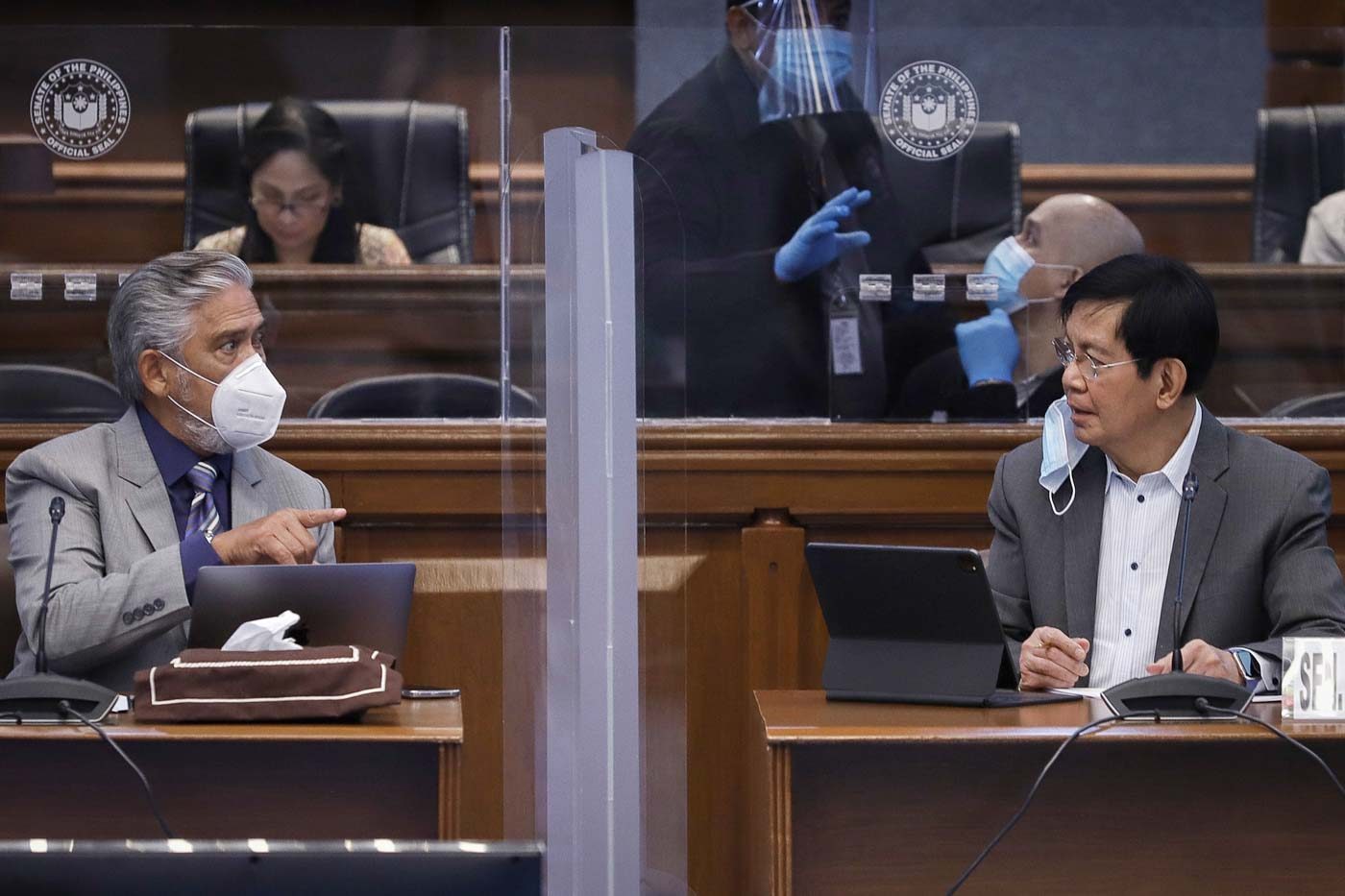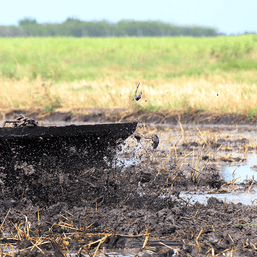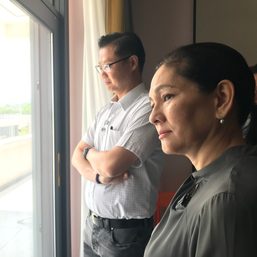SUMMARY
This is AI generated summarization, which may have errors. For context, always refer to the full article.

It was supposed to be a way to make sure hospitals and clinics have enough money during “fortuitous events” such as a pandemic. The so-called Interim Reimbursement Mechanism (IRM) allows the Philippine Health Insurance Corporation (PhilHealth) to give these healthcare institutions cash in advance, proportionate to their previous reimbursements of patients’ insurance claims.
On Tuesday, August 11, senators zeroed in on what appeared to be the IRM’s lack of a legal basis and, moreover, PhilHealth’s disparate IRM fund releases to different hospitals and clinics.
Senate Minority Leader Franklin Drilon called the IRM a “misnomer” because it is, in fact, a system of cash advances and not reimbursements.
Senator Joel Villanueva jested that “IRM” should stand for “inequitable reimbursement mechanism” because, records showed, PhilHealth had been quick to advance cash to some dialysis centers and maternity clinics, while many hospitals handling COVID-19 patients were still waiting for their share.
The current iteration of the IRM is meant to address the COVID-19 pandemic. Because patients of dialysis centers and maternity clinics are particularly vulnerable to the coronavirus, these establishments would be the last places to take in COVID-19 patients, senators said. Therefore, dialysis and maternity clinics should not be the priority of IRM fund releases, they added.
However, of some P14 billion PhilHealth paid out under the IRM as of June 9, P226 million went to freestanding dialysis centers, and P4.7 million to maternity clinics, records showed.
PhilHealth executives at the Senate’s investigation on Tuesday said dialysis patients and pregnant women have been affected by the pandemic, too, and that should justify the fund releases in question. PhilHealth president and CEO Ricardo Morales said the dialysis and maternity clinics were “nasali” or pulled into the pandemic.
No record with the SEC
Of the P226 million paid to dialysis centers, more than P45 million went to B. Braun Avitum Philippines Incorporated, which supposedly has two branches in Tondo, Manila, two in Quezon City, and one in Baguio City.
One of the Tondo branches received over P15 million, the largest share among B. Braun Avitum branches.
Senator Panfilo Lacson said he sent someone to inspect that B. Braun Avitum branch in Tondo, and found that the dialysis clinic had no isolation area for COVID-19 patients, and it referred patients to the nearby Gat Andres Bonifacio Memorial Medical Center to be swab-tested for the coronavirus.
That B. Braun Avitum dialysis clinic in Tondo received its P15 million IRM claim on April 23. Meanwhile, on June 9, the Gat Andres Bonifacio Memorial Medical Center, which handles COVID-19 cases, had yet to receive its P20 million IRM claim, Lacson said.
The Ospital ng Maynila, which also takes in COVID-19 patients, had also not received its P19 million IRM claim as of June 9. Quoting Manila Mayor Isko Moreno, Lacson said the hospital had yet to receive the amount as of Tuesday.
Lacson also checked B. Braun Avitum’s registration with the Securities and Exchange Commission (SEC), and said there was no record of its incorporation. The only close match the SEC found was a certain B. Braun Medical Supplies Incorporated.
“If my office could get SEC records in a matter of two hours, shouldn’t you have at least done due diligence and checked the background of the institutions you are paying millions?” Lacson told the PhilHealth executives at the hearing.
A key witness in the probe, Thorrsson Montes Keith, who recently resigned as PhilHealth anti-fraud legal officer, alleged that PhilHealth senior vice president for legal affairs Rodolfo del Rosario Jr “might own” B. Braun Avitum.
Del Rosario strongly denied this, saying he holds no interests in any healthcare institution.
‘Vengeance rather than need’
Senator Cynthia Villar noted that in Region 6 or Western Visayas, only the Western Visayas Regional Hospital has received its IRM claim of P121 million. Another 32 claims from the region’s public and private hospitals and clinics remain pending.
Morales blamed this on Western Visayas’ top PhilHealth official, regional vice president Valerie Anne Hollero, saying delays in the payment of a region’s IRM claims are the result of the local PhilHealth office’s tardy processing.
Drilon, who is from Iloilo in Western Visayas, said “most or almost all” of the region’s 33 IRM claims had been filed by April 8, and there had been back-and-forth between the PhilHealth Region 6 and head offices. The latest word, from July 8, was that their claims were “up for release.”
Morales said he had spoken on the phone with Hollero about these claims.
“So it is not true that it has not been processed,” Drilon told Morales.
“It is quite obvious that [the problem] is in the head office, not in the regions, as wrongfully claimed by Mr Morales,” Drilon said.
Because Hollero was one of the witnesses who exposed corruption in PhilHealth during a previous Senate investigation in 2019, Drilon said it appears that the state insurer pays out IRM funds based on “vengeance rather than need.”
‘Favoritism’
The hospital that received the highest IRM payment in the country was the Southern Philippines Medical Center in Davao City with P326 million.
This, even if the Davao region’s 1,568 confirmed COVID-19 cases as of August 10 were far fewer than Metro Manila’s 75,399 confirmed cases.
The Philippine General Hospital in Manila, one of the first to handle COVID-19 cases, received the second highest payment of P263 million.
Senator Joel Villanueva asked Morales how a healthcare institution’s IRM claim – the amount it can receive as advanced payment – is computed.
Morales said it is the hospital’s or clinic’s “90-day historical claim,” or its average daily claim from the previous year multiplied by 90, which should approximate the amount it would need for 3 months.
Villar questioned this, because it does not take into account the fact that some hospitals are designated to handle COVID-19 cases while others are not.
PhilHealth executives argued that all hospitals and clinics are affected by the pandemic, because they take in the overflow of non-coronavirus patients from designated COVID-19 hospitals.
There should be a separate program for that, the senators said, because the IRM was meant to address COVID-19. Del Rosario said it was a matter of interpretation of the PhilHealth memo that authorized the program’s current iteration.
Drilon asked Commission on Audit chief Michael Aguinaldo whether the IRM has sound legal basis. Aguinaldo said that although the law generally prohibits the government from making advanced payments, the IRM is a “sort of deposit,” which the Universal Health Care Act allows.
Senate President Pro Tempore Ralph Recto said he has no problem with the IRM as a policy, as he sees the need to ensure hospitals have funds to keep running during crises. The problem, Recto said, is the “palakasan” – the politics – behind the fund releases.
Villanueva, who noted that many COVID-19 referral hospitals have only received 70% of their IRM claims or even less, said PhilHealth appeared to have its “favored” ones. – Rappler.com
Add a comment
How does this make you feel?






![[Time Trowel] Evolution and the sneakiness of COVID](https://www.rappler.com/tachyon/2024/02/tl-evolution-covid.jpg?resize=257%2C257&crop=455px%2C0px%2C1080px%2C1080px)







There are no comments yet. Add your comment to start the conversation.